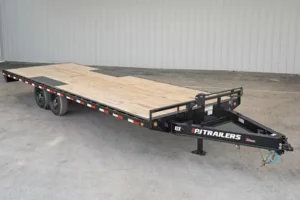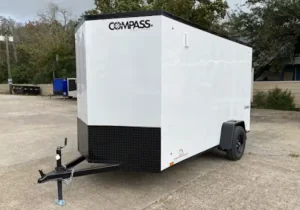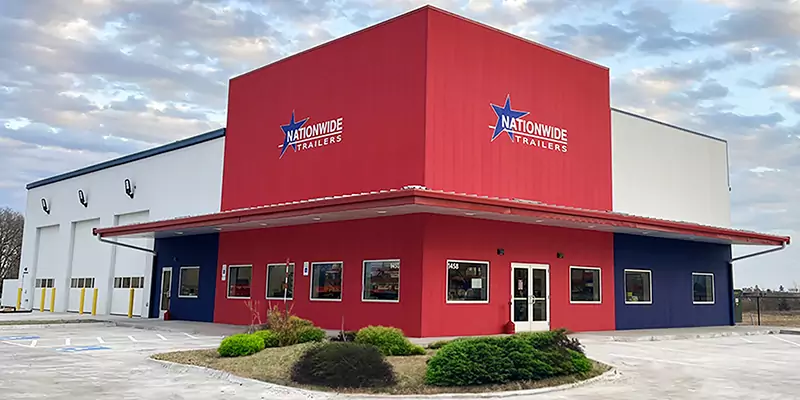For individuals and businesses that rely on trailers as an essential part of their daily operations, neglecting routine maintenance can lead to not just inconvenience but also costly repairs and, more significantly, safety risks. With the nation’s extensive fleet of trailers, ensuring that every unit is well-maintained is a top priority.
This comprehensive trailer maintenance checklist is your guide to keeping the wheels turning — literally. We’ll take you through an all-encompassing guide of activities to keep your equipment trailer functioning safely, efficiently, and for an extended life. Nationwide Trailers locations, like Odessa, TX, can help with all of your trailer maintenance needs!
Tires: The Unsung Heroes Need Attention Too
Your trailer’s tires are the first point of contact with the road, and they’re prone to significant wear and tear.
Check for Wear and Tear
Start by looking for signs of uneven or irregular wear. Any abnormally worn tires should be promptly replaced to avoid further damage or imbalance in your trailer’s operation.
Maintain Proper Tire Pressure
Underinflated tires can lead to overheating and could result in a tire blowout, especially when carrying heavy loads. Always refer to the trailer’s manual or the side of the tires for the recommended pressure and maintain it within a safe range.
Don’t Neglect Wheel Alignment
A misaligned trailer can lead to issues with balance, stability, and proper wear on the tires. Regular checks and alignments can save your tires and improve the trailer’s fuel efficiency.
Brake System: Crucial for Stopping and Safety
A smooth and reliable braking system is crucial for safe trailering, especially when navigating high-traffic or hilly areas.
Inspection Protocol
Inspect brake pads or shoes for any signs of wear and make sure they have the manufacturer-recommended amount of thickness left.
Brake Adjustments
Adjust drums periodically to maintain the required clearance and ensure the brakes engage smoothly without slipping.
Bleeding Air from the Brake Lines
Air in the brake lines can lead to spongy brakes and decreased stopping power. Regularly check for air in the brake lines and bleed them when necessary.
Lights and Electrical: Stay Visible, Stay Safe
Visibility is vital, and properly functioning lights and electrical systems help you communicate your actions on the road to others.
Regular Checkups
Inspect and test all lights — brake, turn signals, hazard, and running lights. Replace bulbs and broken lenses immediately when required.
Electrical Wiring
Ensure all wiring is secure and free from damage. Properly routed, functioning wiring is vital to prevent electrical shorts or damage to the trailer.
Battery Maintenance
For trailers with battery-powered systems, keep the battery charged and replace it according to the specified service life.
Hitch and Coupler: The Connection That’s More Than Metal
The hitch and coupler are essential for safe and secure towing. Any issues here could spell disaster on the road.
Visual Inspection
Inspect the hitch and coupler for structural integrity and signs of wear, including cracks, bends, or rust.
Proper Operation
Ensure the coupler latches securely and the hitch ball fits correctly. Any play in the connection should be addressed to maintain a tight fit.
Regular Lubrication
The hitch mechanism should be adequately lubricated to permit smooth operation and to prevent rusting.
Regular Cleaning and Lubrication: A Step Beyond Shine
A clean and well-lubricated trailer not only looks good but also performs better.
Regular Washes
Keep your trailer clean to prevent corrosion and to ensure good visibility of lights and reflective surfaces.
Protect Moving Parts
Moving parts, like hinges and joints, should be kept lubricated to prevent damage and to ensure they don’t seize up.
Special Attention
Give extra care to areas prone to collecting debris and moisture, such as under fenders and around the hitch area.
Benefits of a Routine Maintenance Regimen
By adhering to a scheduled trailer maintenance routine, you can enjoy several notable benefits:
- Enhanced Safety
- Regular checks and maintenance reduce the likelihood of mechanical failures, which are common causes of accidents.
- Prolonged Lifespan
- A well-maintained trailer will endure more miles and years of use before needing replacement.
- Increased Resale Value
- A documented history of regular maintenance increases the value of a used trailer, should you decide to sell or trade-in.
How Often Should You Go Through the Checklist?
Regularity and timing are key elements of any maintenance plan.
In a typical schedule, your checklist should be completed:
- Before every trip to ensure immediate issues are caught
- Monthly to catch wear and tear that can develop between trips
- Seasonally or bi-annually for a comprehensive tune-up
Remember, the more you use your trailer, the more frequent your inspections should be.
Conclusion: Trailering for the Long Haul
The mantra ‘a stitch in time saves nine’ is never truer than when maintaining your trailer. Regular checks and minor repairs can prevent a multitude of problems, keeping your trailer safe, reliable, and in service for years to come.
Now that you’ve armed yourself with the ultimate trailer maintenance checklist, it’s time to roll up your sleeves and get checking! Don’t forget, maintaining your equipment trailer is as important as maintaining the vehicles towing it. Whether you’re hauling construction equipment, livestock, or just about anything else, keeping your trailer in inspect-worthy condition is a mandatory step in any successful trip or operation.
For more information or if you’re looking to secure a top-quality equipment trailer in Odessa, TX, our friendly experts at Nationwide Trailers are here to assist you. Happy maintaining!



